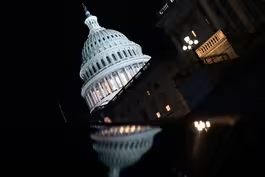
FDA warns 'gas station heroin' widely available in U.S.
Clip: 2/13/2024 | 7m 21sVideo has Closed Captions
FDA warns addictive 'gas station heroin' supplement widely available in U.S.
The Food and Drug Administration has issued warnings about a potentially addictive dietary supplement that’s widely available in the U.S. "Neptune’s Fix" is often sold as a supplement and features an ingredient called tianeptine, popularly known as "gas-station heroin." Ali Rogin reports.
Problems playing video? | Closed Captioning Feedback
Problems playing video? | Closed Captioning Feedback
Major corporate funding for the PBS News Hour is provided by BDO, BNSF, Consumer Cellular, American Cruise Lines, and Raymond James. Funding for the PBS NewsHour Weekend is provided by...

FDA warns 'gas station heroin' widely available in U.S.
Clip: 2/13/2024 | 7m 21sVideo has Closed Captions
The Food and Drug Administration has issued warnings about a potentially addictive dietary supplement that’s widely available in the U.S. "Neptune’s Fix" is often sold as a supplement and features an ingredient called tianeptine, popularly known as "gas-station heroin." Ali Rogin reports.
Problems playing video? | Closed Captioning Feedback
How to Watch PBS News Hour
PBS News Hour is available to stream on pbs.org and the free PBS App, available on iPhone, Apple TV, Android TV, Android smartphones, Amazon Fire TV, Amazon Fire Tablet, Roku, Samsung Smart TV, and Vizio.
Providing Support for PBS.org
Learn Moreabout PBS online sponsorshipAMNA NAWAZ: The Food and Drug Administration has issued warnings about a potentially addictive dietary supplement that's widely available in the U.S. Ali Rogin has the latest.
ALI ROGIN: The FDA is asking Americans not to purchase or use any products from the supplemental brand Neptune's Fix.
It contains a substance called tianeptine.
Some countries have approved the drug to treat depression and anxiety.
It's unapproved in the U.S., but readily available on store shelves and online.
It's been nicknamed gas station heroin, and it can be highly addictive.
An uptick in use has led the FDA to issue several warnings about tianeptine and its potential side effects, including seizures, loss of consciousness and death.
Dr. Pieter Cohen is an associate professor of medicine at Harvard Medical School, and joins me now.
Thank you so much, Dr. Cohen.
Can you explain exactly what tianeptine is?
DR. PIETER COHEN, Harvard Medical School: Sure, Ali.
Tianeptine is a pharmaceutical drug originally produced in Europe as an antidepressant.
Unfortunately, at higher levels, it can be addictive, and for that reason, it's not gotten widespread use.
It has never been approved for use for any medical reason in the United States.
ALI ROGIN: If it has not been approved for use, how is it that it can be sold in the United States?
DR. PIETER COHEN: So, what we see as a common and, sadly, tragic pattern is that many companies take foreign drugs and introduce them directly to consumers in the United States by selling them as if they are dietary supplements.
And they just appear on the market and start selling them to consumers.
ALI ROGIN: We spoke earlier to two health professionals who have seen patients who have been using tianeptine, and I want to play some of what they told us.
DAWN SOLLEE, Jacksonville Poison Control Center: These patients definitely have increased heart rates, they're very agitated, and they will admit that they use a lot of the product, so, in other words, that they're using it very routinely, that they have built up such a high tolerance to it and a craving for it that they will go to great lengths to get it.
The presentation of the withdrawal is going to be very similar to somebody who would potentially be going through oxycodone withdrawal, heroin withdrawal.
DR. WILLIAM RUSHTON, Alabama Poison Information Center: We were putting a fair number of people actually in our intensive care units, and we had to put them in there just because they were becoming so agitated, so confused.
There was concerns for heart problems, concerns for people having seizures.
And so while some people, like with many withdrawal patterns, may just feel a little bit uncomfortable, a fair number of people get very, very ill and require very close monitoring with it.
ALI ROGIN: You heard that last doctor say a fair number of people that he's seeing.
Do we have a sense of just how big this problem is with the substance?
DR. PIETER COHEN: Yes, it's really ticked up over the last decade.
So, back before 2015, we had never heard of tianeptine here.
And poison control calls, reports to the FDA, very serious ones like that were described, from seizures to stopping breathing to the point of intubation, and deaths have all been reported and they're coming in more frequently.
ALI ROGIN: The FDA has issued several warnings over the past six years.
And we should also note here that Neptune's Fix has agreed to a voluntary recall.
But is -- are warnings all that the FDA can do?
Why are they -- why are their hands seemingly so tied?
DR. PIETER COHEN: Right.
So there's two problems here.
One is how it got on the market in the first place.
And that's because there's no need for companies to vet products that they sell as dietary supplements with the FDA before they're being sold.
That's a major problem.
It would require a change to the law.
But there's a second major problem here, which is that the FDA has been aware of tianeptine being imported into the United States since 2015.
That's been nine years.
And like you mentioned, it was in 2018 when they first warned about tianeptine.
So, the fact that it's been many years since the FDA was aware of the risks, and it has done nothing other than issue warnings to consumers and to the company is, frankly, embarrassing, as they're neglecting their responsibility to protect the public from dangerous dietary supplements.
ALI ROGIN: Does this represent negligence on the part of the FDA?
Or is this simply how the regulatory framework has been constructed and has existed for so long?
DR. PIETER COHEN: So, the fact that tianeptine is sold in the United States in the first place back in 2018, there's no negligence on the FDA's part.
That's how the situation is structured, our regulatory framework is structured.
However, the fact that it's still sold today and that people are still dying and ending up in intensive care units due to tianeptine falls completely on the FDA not doing their part, ensuring that the dangerous supplements are removed from the marketplace.
ALI ROGIN: Several states have already taken the steps of banning tianeptine.
Do we expect other states to go in that direction?
DR. PIETER COHEN: Unfortunately, with the FDA not moving definitively as they need to, and they could, the states are left to fend for themselves to protect their own citizens against dangerous dietary supplements such as tianeptine.
And so I would expect more states to move aggressively against these products.
ALI ROGIN: Is there a role that Congress could play in addressing this?
DR. PIETER COHEN: So Congress could have two very impactful roles.
Number one, they could ask the FDA to enforce the law.
And that is, when there's dangerous dietary supplements, that they're off -- they're removed from source shelves and the FDA uses all their enforcement act -- potential, including mandatory recalls, to do that job.
The second thing they would need to do, though, if we need to -- if we're going to protect consumers from the next tianeptine down the road, is reform the law so that the FDA can at least ensure that products that are introduced into the United States' dietary supplements are not foreign dangerous drugs.
ALI ROGIN: There are other dietary supplements out there that also are not regulated by the FDA or approved, kratom, phenibut among them.
What are your concerns about those substances?
DR. PIETER COHEN: Right.
So, kratom and phenibut are two other drugs that are sold as dietary supplements, but shouldn't be.
And the FDA is not doing enough to get those products off store shelves.
We have actually done a study of phenibut where we looked at what happened to brands of phenibut before and after FDA warnings.
Well, we found that dosages of the phenibut actually increased in the products after FDA warnings.
So the FDA's actions are inadequate to date, and they need to do a lot more, because it's not just these three products, tianeptine, kratom, and phenibut, but more than a dozen other foreign drugs that are being sold currently as dietary supplements in the United States.
ALI ROGIN: Dr. Pieter Cohen, associate professor of medicine at Harvard Medical School, thank you so much for joining us.
DR. PIETER COHEN: My pleasure, Ali.
How AI-generated misinformation threatens election integrity
Video has Closed Captions
Clip: 2/13/2024 | 6m 45s | How AI-generated misinformation threatens election integrity (6m 45s)
Innocent people jailed in El Salvador's gang crackdown
Video has Closed Captions
Clip: 2/13/2024 | 9m 36s | Thousands of innocent people jailed in El Salvador's gang crackdown (9m 36s)
Jeffrey Wright on his performance in 'American Fiction'
Video has Closed Captions
Clip: 2/13/2024 | 8m | Jeffrey Wright on his Oscar-nominated performance in 'American Fiction' (8m)
'Momfluencers' urged to stop showing kids on social media
Video has Closed Captions
Clip: 2/13/2024 | 10m 6s | 'Momfluencers' urged to stop showing kids on social media to protect their privacy (10m 6s)
Ukraine aid approved by Senate faces GOP opposition in House
Video has Closed Captions
Clip: 2/13/2024 | 5m 59s | Senate approves Ukraine aid, but bill faces GOP opposition in House (5m 59s)
Providing Support for PBS.org
Learn Moreabout PBS online sponsorship
- News and Public Affairs

FRONTLINE is investigative journalism that questions, explains and changes our world.

- News and Public Affairs

Amanpour and Company features conversations with leaders and decision makers.












Support for PBS provided by:
Major corporate funding for the PBS News Hour is provided by BDO, BNSF, Consumer Cellular, American Cruise Lines, and Raymond James. Funding for the PBS NewsHour Weekend is provided by...




